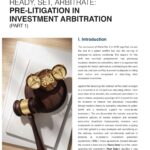Introduction
Arbitration has emerged as a popular alternative to litigation for dispute resolution in Vietnam, particularly in commercial matters. By choosing arbitration, parties can potentially save time, money, and avoid lengthy court proceedings. In this article, we will delve into the details of arbitral proceedings in Vietnam, providing you with a better understanding of this important dispute resolution method. If you need assistance with arbitration or other legal matters, our law firm is here to help you navigate the complex legal landscape.
I. Initiating Arbitral Proceedings
A. Arbitration Agreement
Arbitral proceedings in Vietnam begin with the signing of an arbitration agreement. This agreement can be a standalone document or an arbitration clause incorporated into a contract. The agreement must be in writing and should clearly specify that the parties agree to submit their disputes to arbitration. It is advisable to include the arbitration rules, the arbitral institution, the number of arbitrators, and the language of the proceedings in the agreement.
B. Notice of Arbitration
Once a dispute arises, the claimant initiates the arbitration by submitting a Notice of Arbitration to the respondent and the chosen arbitral institution. The Notice should include information about the parties, a description of the dispute, the relief sought, and a reference to the arbitration agreement. The respondent may respond to the Notice with a Statement of Defense or a counterclaim.
II. Arbitral Tribunal
A. Appointment of Arbitrators
The arbitral tribunal typically consists of one or three arbitrators, depending on the agreement of the parties. If the parties have not agreed on the number of arbitrators, the default rule is that the tribunal will consist of three arbitrators. The parties can either select the arbitrators themselves or request that the chosen arbitral institution appoint them. In either case, the arbitrators must be independent and impartial.
B. Challenges to Arbitrators
A party may challenge the appointment of an arbitrator if there are justifiable doubts about the arbitrator’s impartiality, independence, or qualifications. The challenge should be submitted to the arbitral institution, which will decide whether to uphold or reject the challenge.
III. Arbitral Proceedings
A. Exchange of Written Submissions and Evidence
After the formation of the arbitral tribunal, the parties exchange written submissions, which typically include a Statement of Claim, a Statement of Defense, and possibly a Statement of Counterclaim. The parties also submit documentary evidence to support their claims and defenses.
B. Hearings
The arbitral tribunal may hold hearings for the examination of witnesses, expert testimony, or oral arguments. Hearings can be held in person or remotely, depending on the parties’ preferences and the tribunal’s discretion. The parties can also agree to conduct the proceedings entirely based on written submissions, without a hearing.
C. Interim Measures
During the arbitration proceedings, a party may request interim measures to protect its rights or preserve evidence. The arbitral tribunal may order such measures, including injunctions, asset preservation orders, or orders for the preservation of evidence.
D. Confidentiality
Arbitration proceedings in Vietnam are generally confidential, and the parties, arbitrators, and the arbitral institution are usually bound by confidentiality obligations. This confidentiality can be an advantage for parties seeking to protect their commercial interests or reputation.
IV. The Arbitral Award
A. Rendering the Award
Once the hearings and the submission of evidence are complete, the arbitral tribunal will deliberate and issue an arbitral award. This award is a written decision that resolves the dispute between the parties and may include a determination of liability, damages, and the allocation of costs.
B. Finality and Enforceability
Arbitral awards are binding on the parties and can be enforced in the same way as a court judgment. Vietnam is a signatory to the 1958 New York Convention on the Recognition and Enforcement of Foreign Arbitral Awards, which means that foreign arbitral awards can be recognized and enforced in Vietnam, subject to certain conditions. Domestic arbitral awards can also be enforced through the Vietnamese court system.
C. Setting Aside an Arbitral Award
A party may apply to the competent court to set aside an arbitral award in limited circumstances, such as:
- The parties to the arbitration agreement were, under the applicable law, incapable of entering into the agreement, or the agreement is not valid.
- The party against whom the award is invoked was not given proper notice of the appointment of the arbitrator or of the arbitration proceedings or was otherwise unable to present its case.
- The award deals with a dispute not contemplated by or not falling within the terms of the submission to arbitration, or it contains decisions on matters beyond the scope of the arbitration agreement.
- The composition of the arbitral tribunal or the arbitral procedure was not in accordance with the agreement of the parties or the law of the country where the arbitration took place.
- The award has not yet become binding on the parties or has been set aside or suspended by a competent authority of the country in which, or under the law of which, the award was made.
V. Conclusion
Arbitral proceedings in Vietnam provide a flexible and efficient alternative to litigation for resolving disputes. By understanding the various stages of the arbitration process, parties can make informed decisions and better manage their risks when entering into arbitration agreements. If you require assistance with arbitration or any other legal matter, our law firm is here to help. We have a team of experienced attorneys who can guide you through the arbitration process and represent your interests in the most effective manner. Please do not hesitate to contact us to discuss your needs and learn more about how we can assist you.
Note: This article is for general information purposes only and does not constitute legal advice. Each case is unique, and specific legal advice should be sought from a qualified attorney based on the individual circumstances of your matter.







